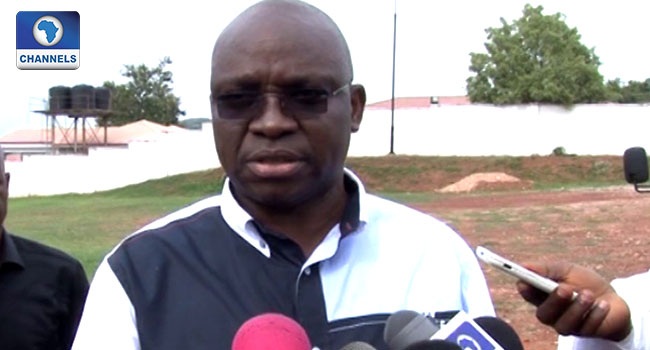FORMER MINISTER OF STATE FOR DEFENCE, MUSILIU ACCUSED OF MONEY LAUNDERING
The Federal High Court sitting in Lagos has
admitted in evidence a statement made by the late Justin Erukaa, a Personal
Assistant to the former Minister of State for Defence Senator Musiliu
Obanikoro.
Justice Mojisola Olatoregun admitted the
statement in the trial of the former Governor of Ekiti state, Mr Ayodele
Fayose.
Mr Fayose is on trial for allegedly receiving
and keeping N1.2billion and $5million allegedly stolen from the Office of
National Security Adviser (ONSA) contrary to the Money Laundering Act.
He had pleaded not guilty when he was
arraigned on an 11-count charge last October 22.
Sen. Obanikoro is testifying as the fifth
prosecution witness in the trial.
At the last adjourned date of Feb 7th,
Obanikoro was absent in court but despite his absence, the court listened to
arguments on whether a statement made by Justin Erukaa, the late Personal
Assistant to the former Minister of State for Defence Senator Musiliu
Obanikoro, could be tendered & admitted as evidence especially as he was
not a party to the case.
A defence counsel, Olalekan Ojo (SAN) had
argued that the statement was relevant to the case because Erukaa made the
statement in the course of the investigation.
Obanikoro had said in his testimony that he
sent Erukaa on errands, including to collect over $1million and that he came to
meet him in Ekiti.
“In law, a statement made to the EFCC in the course of the investigation is admissible in evidence without the maker being called as a witness or being a party to proceedings.
“It is not the law that a document which is not tendered through the maker is not admissible,” the SAN said, relying on sections 39 and 83 of the Evidence Act.
“In law, a statement made to the EFCC in the course of the investigation is admissible in evidence without the maker being called as a witness or being a party to proceedings.
“It is not the law that a document which is not tendered through the maker is not admissible,” the SAN said, relying on sections 39 and 83 of the Evidence Act.
But, the EFCC Counsel, Rotimi Jacobs opposed
the move to tender the statement, arguing that it was not admissible in law. He
said the sections relied on by Ojo were not applicable in the circumstances.
“He wants to smuggle the statement in,”
Jacobs said. According to Jacobs, certain conditions must be met before a
statement made by a dead person could be tendered, including that the person
must have appeared in the proceedings.
At a ruling delivered today, Justice Mojisola
Olatoregun overruled the EFCC Prosecutor and held that Sections 39 and 49 of
the Evidence Act make such a document admissible.
She said the issue was what weight the court would attach to the statement, and this the court would determine at a later date.
She said the issue was what weight the court would attach to the statement, and this the court would determine at a later date.
After admitting the statement, the case
continued with the cross-examination of Obanikoro.
Obanikoro told the court that he supervised
the account of the company, Sylvan Mcnamara Ltd’s which housed the money in
issue which was received from the office of the National Security Adviser.
The money which he says came in 3
transactions were for the security of Lagos, the elections in Ekiti and the
elections in Osun state.
When asked if elections matters were security
matters, Obanikoro said, “matters of election can be matters of security”.
The trial was adjourned to continue on
Tuesday, March 19.






.jpeg)
Comments
Post a Comment